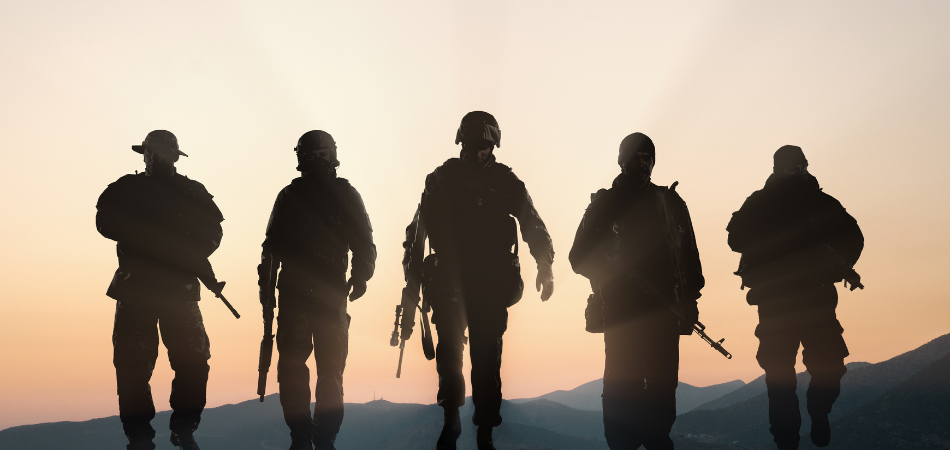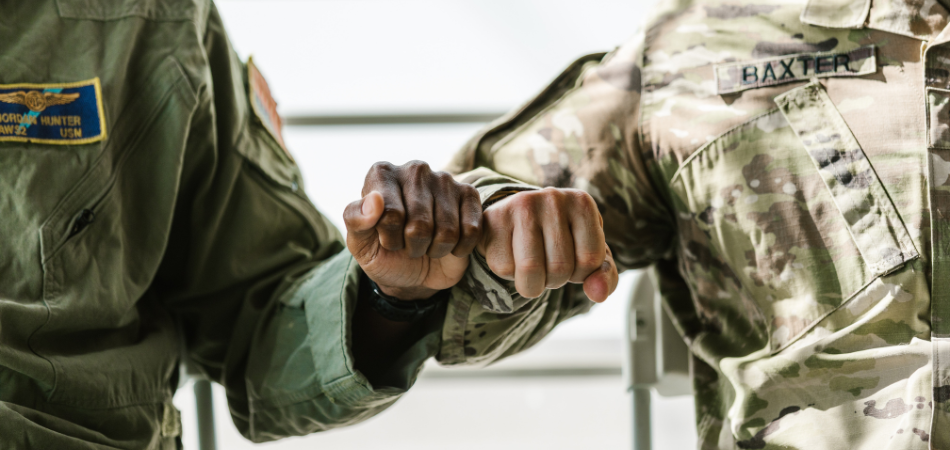Veterans often face an array of complex challenges upon returning from service, including physical injuries, mental health issues such as PTSD, and difficulties readjusting to civilian life. These factors can significantly increase the risk of developing substance abuse disorders. Combat exposure, prolonged deployments, and the stress of military life can all contribute to the development of addiction.

What makes Veterans susceptible to addiction?
- High-stress environments: Military service often involves exposure to high-stress situations, whether in combat zones, during training exercises, or even in day-to-day operations. The constant pressure to perform under extreme conditions can lead to heightened levels of stress, which may drive some individuals to seek relief through substance use.
- Traumatic experiences: Many veterans have experienced traumatic events during their service, such as combat exposure, witnessing injuries or death, or facing life-threatening situations. These experiences can leave lasting emotional scars and contribute to the development of mental health conditions like PTSD, depression, and anxiety. Substance use may become a way to numb the pain or cope with intrusive memories and flashbacks.
- Easy access to substances: In some military environments, access to alcohol and prescription medications may be readily available. Deployed soldiers may encounter local cultures where alcohol or other substances are widely used and easily accessible. Additionally, prescription medications for pain management or mental health conditions may be prescribed liberally, leading to potential misuse or dependence.
- Self-medication: Veterans struggling with mental health issues such as PTSD, depression, or anxiety may turn to alcohol or drugs as a form of self-medication. Substance use can temporarily alleviate symptoms and provide a sense of relief or escape from distressing thoughts and emotions. However, this self-medication often exacerbates underlying mental health conditions and can lead to the development of addiction.
- Normalisation of substance use: Within the military culture, particularly in certain units or environments, substance use may be normalised or even encouraged as a way to cope with the demands of service. Social gatherings, celebrations, and downtime may revolve around alcohol consumption, creating an environment where excessive drinking or drug use is perceived as acceptable behaviour.
- Stigma and barriers to seeking help: Despite increased awareness of mental health issues in the military, there remains a stigma surrounding seeking help for psychological concerns or substance abuse. Veterans may fear judgement from their peers or worry about the impact on their military careers if they disclose their struggles with addiction. This fear of stigma and reprisal can deter veterans from seeking the support and treatment they need.
- Transition to civilian life: The transition from military to civilian life can be challenging for many veterans, particularly if they struggle to find purpose, employment, or a sense of belonging outside of the military community. Feelings of isolation, alienation, or loss of identity can contribute to substance use as veterans attempt to cope with the stress of transitioning to a new way of life.
Understanding these factors is crucial for developing effective interventions and support systems tailored to the unique needs of veterans struggling with addiction. By addressing the underlying causes and providing specialised care, we can better support veterans on their journey to recovery and help them reclaim their lives from addiction.
Why might Veterans avoid rehab treatment?
Despite the evident need for help, many veterans may avoid seeking treatment due to various factors such as stigma surrounding mental health issues, fear of judgement, concerns about their military career, or a lack of understanding about available resources. Some may also feel a sense of pride or self-reliance that makes them hesitant to ask for assistance.
Rehab treatment for Veterans
Rehabilitation programmes for veterans provide a vital lifeline for individuals struggling with addiction by offering a supportive and structured environment conducive to healing and recovery. These programmes are specifically tailored to address the unique needs and challenges faced by veterans, taking into account their military service experiences and associated traumas.
Key components of rehab for veterans include:
Each component plays a crucial role in the holistic approach to rehab for veterans. By addressing the physical, psychological, and social aspects of addiction, these programmes aim to empower veterans to overcome their substance use disorder and rebuild fulfilling lives post-service.
Why is Veteran inclusive rehab important?
Veterans deserve specialised care that acknowledges their service-related experiences and addresses the underlying issues contributing to their addiction. By providing veteran-inclusive rehab, we honour their sacrifices and offer them the best chance at long-term recovery and fulfilling civilian life. Tailoring treatment to the needs of veterans increases the likelihood of successful outcomes and helps address the specific challenges they may face during recovery.
What to expect from a Veteran friendly rehab
In a veteran-friendly rehab programme, individuals can expect a tailored and understanding approach that acknowledges their unique experiences and challenges associated with military service. These programmes prioritise creating a safe and supportive environment where veterans can feel understood, respected, and valued. Expect comprehensive assessments that take into account the impact of military service on physical and mental health, including any trauma-related issues such as PTSD. Treatment plans are personalised to address each veteran’s specific needs and goals, utilising evidence-based therapies and specialised interventions that have been proven effective for veterans. Moreover, veteran-friendly rehab programmes foster a sense of camaraderie and peer support, recognizing the importance of connecting with others who share similar experiences and creating a space where veterans can feel a sense of belonging and understanding. Veterans can expect compassionate care from staff members who have received specialised training in veteran-specific issues, fostering trust and rapport throughout the treatment process. Overall, veterans can anticipate a rehabilitation experience that honours their service, promotes healing, and empowers them to achieve lasting recovery and wellness.
We can help you
If you or a loved one is a veteran struggling with addiction, don’t hesitate to reach out to us. Our team is here to provide guidance, support, and assistance in finding the right rehab programme tailored to your needs as a veteran. Take the first step towards recovery and contact us today. We understand the challenges you’re facing, and we’re here to help you overcome them and reclaim your life from addiction.
Call our admissions line 24 hours a day to get help.





